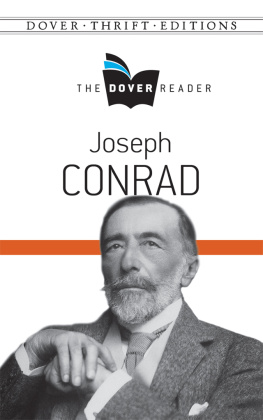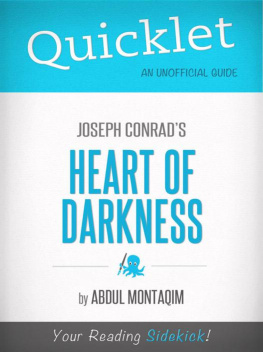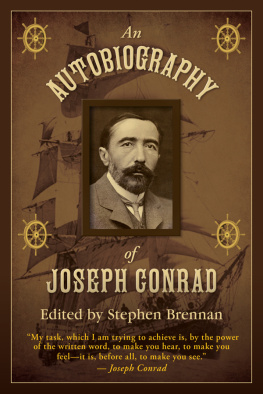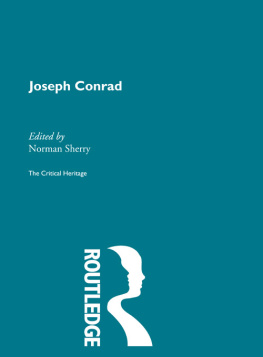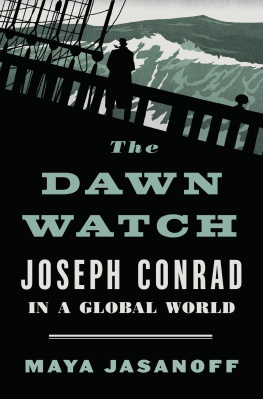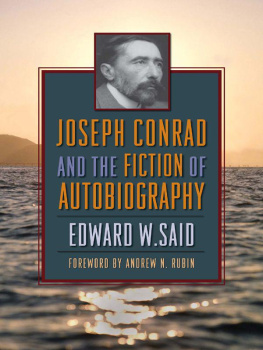Rethinking Joseph Conrads Concepts of Community
Also available from Bloomsbury
Conrad, Faulkner, and the Problem of NonSense, Maurice Ebileeni
Conrads Heart of Darkness, Allan Simmons
Conrads Heart of Darkness and Contemporary Thought, Nidesh Lawtoo
Rethinking Joseph Conrads Concepts of Community
Strange Fraternity
Kaoru Yamamoto
Bloomsbury Academic
An imprint of Bloomsbury Publishing Plc

Bloomsbury Academic
An imprint of Bloomsbury Publishing Plc
50 Bedford Square London WC1B 3DP UK
1385 Broadway New York NY 10018 USA
www.bloomsbury.com
BLOOMSBURY and the Diana logo are trademarks of Bloomsbury Publishing Plc
First published 2017
Kaoru Yamamoto, 2017
Kaoru Yamamoto has asserted his right under the Copyright, Designs and Patents Act, 1988, to be identified as Author of this work.
All rights reserved. No part of this publication may be reproduced or transmitted in any form or by any means, electronic or mechanical, including photocopying, recording, or any information storage or retrieval system, without prior permission in writing from the publishers.
No responsibility for loss caused to any individual or organization acting on or refraining from action as a result of the material in this publication can be accepted by Bloomsbury or the author.
British Library Cataloguing-in-Publication Data
A catalogue record for this book is available from the British Library.
ISBN: HB: 978-1-4742-5002-3
ePDF: 978-1-4742-5004-7
ePub: 978-1-4742-5003-0
Library of Congress Cataloging-in-Publication Data
A catalog record for this book is available from the Library of Congress.
Cover design: Eleanor Rose
Cover image Private Collection/Bridgeman Images
To find out more about our authors and books visit www.bloomsbury.com. Here you will find extracts, author interviews, details of forthcoming events and the option to sign up for our newsletters.
Contents
I am grateful to the Ministry of Education, Culture, Sports, Science, and Technology in Japan (Grant No. 24520301) and the University of Shiga Prefecture for providing me with generous financial assistance that allowed me to conduct research and present papers at conferences. My thanks are also due to friends and colleagues who gave invaluable advice and comments on earlier versions of my essays, specifically to Professor Nicholas Royle, without whose initial suggestion this project would not have commenced. Finally, my enduring respect and gratitude go to Minoru Kuriyama, professor emeritus at Osaka City University and the University of Shiga Prefecture.
I would like to express my thanks to the editors and the publishers for permission to reprint, in revised form, material that was first published as follows:
, Rescuing the Singular Plurality in Joseph Conrad, Academic Reports of the University Center for Intercultural Education, the University of Shiga Prefecture, vol. 14 (Hikone: University Center for Intercultural Education, 2009), 91101.
formed chapters in Kaoru Yamamoto, Jiko no muko e: Konraddo no chutanpen shosestu wo yomu (Beyond Self: Readings of Conrads Novellas and Short Stories) (Okayama: Daigaku kyouiku shuppan, 2012), 2437; 3853; 7691.
, Hospitality in The Secret Sharer, in Wine in Old and New Bottles: Critical Paradigms for Joseph Conrad, vol. 23 of Conrad: Eastern and Western Perspectives series, ed. Wiesaw Krajka (Boulder, CO: East European Monographs; Lublin: Maria Curie-Skodowska University Press; New York: Columbia University Press, 2014), 253268.
, The Warriors Soul and the Question of Community, The Conradian: The Journal of the Joseph Conrad Society (UK) 35. 1 (Spring 2010): 7891.
, Strange Fraternity in The Rover,LEpoque Conradienne: Journal of the French Conrad Society, 38 (2013): 103117.
, Toward a Possible Partage of Memory: History and Solidarity in Suspense, Solidarity, Memory and Identity (Newcastle upon Tyne: Cambridge Scholars, 2015), 258269.
Versions of were read as presentations at the annual conferences of Joseph Conrad Society of Japan (Tokyo, 2013) and the Joseph Conrad Society (UK) (London, 2015).
This book aims to reevaluate Joseph Conrads underestimated Heart of Darkness and The Secret Sharer, in order to find out what leads to the notion of strange fraternity in his later stories.
Conrads major works have been marked primarily by their sustained exploration into the nature of the self. But in his later works, Conrad ceases those psychological explorations that characterized his middle works, turning
While recent critical approaches, such as gender studies, postcolonialism, and new historicism, have been offering us new readings of Conrads later work,stranger to melancholy as well as introspection, and the old Russian narrator in The Warriors Soul provides no satisfactory clues to his hero Tomassovs conduct.
If the idea of a unified, stable
Their strange fraternity thus disrupts Conrads image as a political conservative or reactionary. Conrads ideas of community have generally been individuality and collectivity.
This book draws on elements of Continental thinkers like Jacques Derrida, singular plurality, or strange fraternity.
* * *
To introduce an idea of who comes after the subject? in Conrad, I begin uncongenial to Conrad than the love relationship, which can also be rethought as a question of community in Nancys terms.
In dreamy. Wamibos deafness occupies an important, while minor, part in the perception of the first person plural narrator we, in facilitating the we narrator to concentrate on the visible universe by turning a deaf ear, as it were, to the racket that may sometimes recall the Russian experiences of the author.
In listening is hardly objectified, spreading and reverberating through space.
strange fraternity.
Napoleonic stories.
we narrator, whom this chapter tries to show as deserving more critical attention, implicitly invites readers to draw an analogy between the wounds in the officers bodies and the gaps in the body of Conrads archive of the Napoleonic era, namely, the short story The Duel. By way of conclusion, this chapter suggests tentatively linking the textual fissure and a messianic opening with the coming of the other to the text: Napoleon and the reader. Such hospitality, a welcome of the other, is what Derrida would think to be the very condition of history.
soldiers or sailors.
Ever since gender approaches rediscovered The Arrow of Gold as an aesthetically self-conscious, modernist text rather than a pseudo-autobiography, there has been an increasing focus on the question of the Thus, plastic imagination offers us a glimpse of the ways in which Conrad remembers the past, the ways that can also be linked to his engagement with plurality, a question of community in his later historical novels.
In an attempt to reassess Conrads last completed novel, The French Revolutions fraternit.
Lord Jim, for instance, a series of survivors testimonies to a past traumatic event, can be better understood as a multilayered address to another, demanding a listening, than as a statement of an already given, empirical truth. Thinking thus of Conrads history less as a matter of referentiality than of responsibility, the last chapter aims to show that his texts sometimes permit the possibility of history to emerge from the solidarity with the others. First, focusing on the traumatic aspects of Conrads nostalgic recollection, we discuss that his texts are more concerned with the narrators possession by the past than with the narrators possession of the past. The subjective nature of Conrads narrators remembrance of the past has been highlighted, but they can neither fully represent their experiences nor claim the memories as their own; the experiences only repeat. We go on to link the notion of trauma with a history, drawing on Cathy Caruth who sees the possibility of history, no longer straightforwardly referential, arising in the very way we are implicated in each others traumas. The witnessing of the trauma, she asserts, can take place not simply within the individual but rather in cultures and in future generations.


